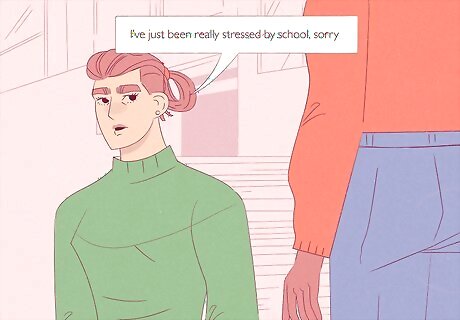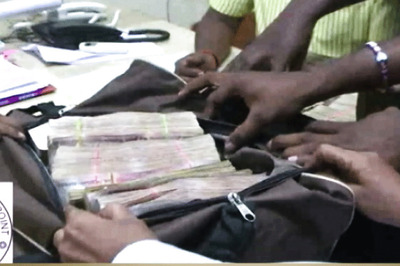
views
Planning Your Lie

Bend the truth. Lying requires a lot more mental effort than telling the truth. Eliminate as much of the mental effort as you can by knowing the lie before you tell it. Try to bend the truth instead of making up an entire story. It is much easier for a person to believe something that could actually happen. For example, instead of making up a story about going to a party, you may go to a party but lie about some of the details such as who else went and what you did. If you went out to eat with your family at a specific restaurant, you may lie and say you went to the restaurant with a date but tell the truth about what you ate.

Tell a believable lie. Ask yourself if you would believe the lie that you are telling. If it is hard for you to believe, the other person probably will not believe it either. Place yourself in the other person's shoes and think of the questions they may ask. This will also help you identify any holes in your story. For example, you probably shouldn't lie about going to a party if your friend knows that your rarely go to them. Also think about the personality and traits of the person that you are lying to. You know the things that are likely to believe. What works on one person may not work on another.

Practice saying the lie. Stand in front of the mirror and practice what you are going to say. If you are not well prepared, you are more likely to make something up on the spot. When you make something up on the spot, it is easier for the other person to notice that you are lying. Consider audio and/or video recording yourself lying. This will help you identify any awkward pauses or mannerisms that you do that may give you away. The more you can practice the better. If you rehearse a lot, it should feel very natural when you talk to the other person.

Try not to involve other people. If possible, do not include any other people in your lie. The more people that know you are lying, the more likely you are to get caught. If you do need someone else to cover for you, only tell them what they need to know. Do not tell them your entire plan. For example, if you are sneaking out of the house to go to a party, do not tell your friend what you are doing. Only tell your friend, “If anyone asks where I was on Friday night, tell them you have no idea.” If you are lying about who you were out with, tell your friend your location, but do mention the people that were there. This way, your friend could confirm your location without blowing your cover.
Telling Your Lie

Keep the lie short. When you lie, there is a tendency to add a lot of extra information and details that you usually would not. The other person may wonder why you are talking so much. Also, you may start to provide details that do not make sense. For example, it is better to say, “I woke up late this morning,” than to say, “I drank coffee to stay up and work on this project last night and then I couldn’t fall asleep. I finally went to sleep and then it was so hard to get out of bed this morning.” Only answer a question that a person asks you.

Be confident. If you do not tell the lie like you believe it, the other person will not believe you either. Believe that you can successfully deceive the other person. If you are unsure of yourself, it will show in your delivery. The other person may be able to tell that you are lying. If you become anxious while you are lying and the person questions you, have an answer ready. For example, if the person asks if you are alright or why are you stuttering, tell them, “I’ve just been really stressed by school/work, sorry.”

Speak on a full bladder. Telling the truth is natural, but telling a lie requires you to control your natural urge and access your inhibitory control. When you have to use the bathroom, you are activating inhibitory control to not use the bathroom on yourself. Practicing self-control in one area makes it easier for you to control your urge to tell the truth. You will be a more convincing liar if you lie with a full bladder. Drink a lot of water 45 minutes before you plan to tell your lie. This will only work if you have to pee while you are telling the lie. Practicing self-control earlier in the day will not help you when it is time to tell your lie.

Move your body naturally. When you talk, you typically move your body and make small movements. If you stand completely still, the person will notice that something is wrong. If you usually talk with your hands, be sure to use your hands when you are telling your lie. Avoid covering your mouth, throat, chest, head, or stomach when you are lying. These are all signs that you are not telling the truth.

Watch your facial expressions. Also avoid making excessive eye contact. You naturally look away and move your eyes around when you talk. Staring at the person without blinking is a clue that you may be lying. Avoid making awkward head movements as well. People tend to tilt their head to the side or bow their head down when they lie.
Living Out the Lie

Write down what you said. Once you have told your lie, you have to live like it is the truth. This can be hard when you do not remember what you said. After you tell the lie, write down the details of the conversation you had with the person. Write down what you said, any questions they asked, and your response to the questions. The person may come back and ask you something about the lie you told. You must keep the same story you had before. Telling the lie is often the easy part. Keeping up with the lie is more difficult.

Cover your tracks. Do not leave any evidence behind that you told a lie. Be extra careful with social media. If you lie and say you did something, but your social media says something different, you will definitely get caught. Avoid using a computer or mobile device to carry out your lie. These things are easy to check and can get you in a lot of trouble. If you wrote something down, cut up the paper and throw it away.

Avoid telling other lies. Lying requires you to have a good memory. The more lies you tell, the harder it will be to keep up with them. If your brain is required to keep up with multiple lies, you may end up telling on yourself. To cut down on the number of lies you tell, do not lie to multiple people. Over time, it will be easier for you to remember the lie you told.

Do not get caught telling other lies. If you get caught lying, it will be harder for people to believe you. You will have a reputation as a liar. People may even assume you are lying even when you are telling the truth. Plan out your lies and keep them to a minimum. Tell the truth the majority of the time. It will make you more trustworthy.

Know when to cut your losses. When you get caught telling a lie, you have to continue to lie to cover it up. You will end up telling more lies than you initially planned to. Instead of one, you have now told 5 or 6 lies. In this case, it is best to just confess. If you confess, you may say, "I didn't tell the truth about ____. I'm really sorry." If you are feeling guilty, confessing will make you feel better.



















Comments
0 comment